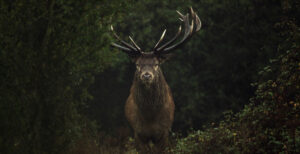Wilding is a nature documentary based on the best selling book by Isabella Tree. It details the creation of Knepp Wildland – a large scale “re-wilding” project that turned once inarable farmland into a haven for British wildlife.

We start with Knepp Estate’s dire beginnings. Knepp Estate was stuck in a flawed system of British agriculture that exacerbated inarability. In order to remain viable, farmers relied on subsidies to pump their land full of chemicals. Fertilisers, herbicides, fungicides – whatever it took to get the soil producing crops. However as soil quality decreased, the reliance on chemicals increased and the cycle raged on.
So the Burrells decided to give up generations of farming to heal the land. It’s a gamble, to be clear. However, given how David Attenborough describes the British Isles as one of the world’s most nature-depleted countries in the world, the potential dividends were worth risking it.
Wilding is an unapologetic anecdote with heart. This isn’t just a feel good glow up. As passionate as the Burrells are about their project, they are careful not to sugarcoat their experience. From the personal struggles of leaving farming behind, to conflict with the neighbours and bureaucracy.
Most importantly, Wilding highlights the interconnectness inherent in nature.
Centuries of digging up the soil at Knepp Estate had decimated the network of mycorrhizal fungi that was its life source. Inspired by Dutch ecologist Frans Vera’s oostvaardersplassen model, the Burrells unleashed their own herds of cattle, horses and pigs to reengineer the landscape. The animals’ fossicking and natural fertilising reintroduced microbes to the landscape and soon attracted insects. And so the ecological loop was revived and we see it unfold on the screen.
Wilding is a visual banquet. The hallmark cinematic pans of the land and close ups of feeding caterpillers and hunting owls are bolstered with re-enactments, computer generated graphics and filmed commentary. It is a rich, engaging experience. It made me feel like I was everywhere, all at once.
However, Wilding also reminds us of how nature documentaries have evolved. We’ve gone from purely marvelling at Earth’s living beings to using nature’s majesty to highlight why we need to protect it.
The conservation message, while loudly blaring in documentaries, often feels generic (reduce, reuse, recycle!). Alternatively, the message focuses on what organisations are doing, without necessarily linking it back to what we can do as individuals.
This is where Wilding excels. While we may not own large swathes of farmland, I couldn’t help but think about my tiny patch of Earth. How can I make the bobtails feel more at home? Which mulch should I use to promote microbial activity in my soil? Wildling has turned the gears in my head and I’m sure my husband is silently cringing at all the work I’m about to make him do.
This is why I believe Wildling is a must watch. Tell your friends, televise it in schools. Because Wilding doesn’t just inspire hope. If viewed with an open mind and heart, it could drive a movement that will benefit our natural world for generations to come.
Wilding is showing at Luna Palace Cinemas for ONE WEEK ONLY from 22nd May.
